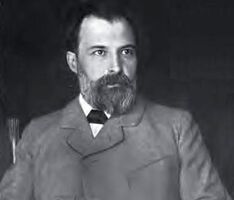Carus, P.: Difference between revisions
No edit summary |
m (Text replacement - "{{Footer}}" to "") |
||
| (2 intermediate revisions by one other user not shown) | |||
| Line 1: | Line 1: | ||
{{Person | {{Person | ||
|HasDrlPage=Yes | |HasDrlPage=Yes | ||
|HasLibPage=Yes | |HasLibPage=Yes | ||
|HasBnwPage=Yes | |HasBnwPage=Yes | ||
|pagename=Carus, P. | |||
|PersonType=Authors of English Works; Editors | |||
|images=File:Carus Paul Wikipedia.jpeg | |||
|MainNamePhon=Paul Carus | |MainNamePhon=Paul Carus | ||
|namefirst=Paul | |namefirst=Paul | ||
| Line 23: | Line 24: | ||
== Publications == | == Publications == | ||
Latest revision as of 14:27, 5 June 2024
| PersonType | Category:Authors of English Works Category:Editors |
|---|---|
| FirstName / namefirst | Paul |
| LastName / namelast | Carus |
| MainNamePhon | Paul Carus |
| bio | An early supporter of Buddhism in America and the proponent of the "religion of science": a faith that claimed to be purified of all superstition and irrationality and that, in harmony with science, would bring about solutions to the world's problems. Carus was born in Ilsenberg in Harz, Germany. He immigrated to America in 1884, settling in LaSalle, Illinois, where he assumed the editorship of the Open Court Publishing Company. He attended the World Parliament of Religions in Chicago in 1893 and became friends with several of the Buddhist delegates, including Dharmapāla and Shaku Sōen, who were among the first to promote his writing.Later, Shaku Sōen's student, Daisetz Teitaro Susuki, woudld spend eleven years working with and for Carus in LaSalle. In 1894, Carus published The Gospel of Buddha according to Old Records, an anthology of passages from Buddhist texts drawn from contemporary translations in English, French, and German, making particular use of translations from the Pāli by Thomas W. Rhys Davids, as well as translations of the life of the Buddha from Chinese and Tibetan sources. Second only to Edwin Arnold's Light of Asia in intellectual influence at the time, The Gospel was arranged like the Bible, with numbered chapters and verses and a table at the end that listed parallel passages from the New Testament. The Gospel was intended to highlight the many agreements between Buddhism and Christianity, thereby bringing out "that nobler Christianity which aspires to the cosmic religion of universal truth." Carus was free in his manipulation of his sources, writing in the preface that he had rearranged, retranslated, and added emendations and elaborations in order to make them more accessible to a Western audience; for this reason, the translated sources are not always easy to trace back to the original literature. He also makes it clear in the preface that his ultimate goal is to lead his readers to the Religion of Science. He believed that both Buddhism and Christianity, when understood correctly, would point the way to the Religion of Science. Although remembered today for his Gospel, Carus wrote some seventy books and more than a thousand articles. His books include studies of Goethe, Schiller, Kant, and Chinese thought. (Source: The Princeton Dictionary of Buddhism, 2014, 168) |
| YearBirth | 1852 |
| YearDeath | 1919 |
| BornIn | Ilsenberg, Harz, Germany |
| IsInGyatsa | No |
| Other wikis |
If the page does not yet exist on the remote wiki, you can paste the tag |
Full Name
Paul Carus

